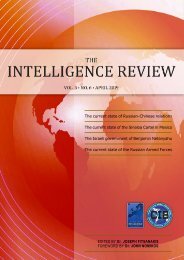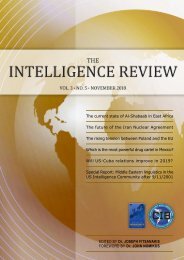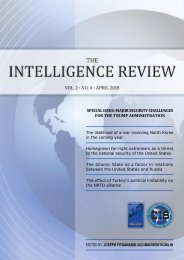The Intelligence Review | volume 4 | issue 7 |
The volume is the product of a transatlantic collaboration between the Chanticleer Intelligence Brief (CIB) and the European Intelligence Academy (EIA), a network of intelligence studies scholars, specialists and students, who are dedicated to promoting collaboration between Europe and the United States in intelligence scholarship and research. As always, the contents of this latest volume of The Intelligence Review are both timely and insightful. Analyst Ryan Lawrence examines a series of recent developments surrounding the Jalisco New Generation Cartel, which is arguably Mexico’s most powerful. Tyra Bjorlo discusses the highly overlooked issue of the rising importance of women in Salafi-jihadist groups, with particular reference to the Islamic State. Kyle Brossard focuses on the ongoing war against maritime piracy in the Indian Ocean and the Gulf of Guinea. Morgan Clasgens brings us up to speed on the current state of the Pakistani Taliban, and considers their future prospects. Audrey Oien evaluates the current and projected status of relations between Russia and China. Joseph Cain focuses on the National Liberation Army, a Colombia-based armed militant group with an increasing presence in Venezuela. And Madison Scholar considers the national-security implications of marijuana legalization in the United States.
The volume is the product of a transatlantic collaboration between the Chanticleer Intelligence Brief (CIB) and the European Intelligence Academy (EIA), a network of intelligence studies scholars, specialists and students, who are dedicated to promoting collaboration between Europe and the United States in intelligence scholarship and research. As always, the contents of this latest volume of The Intelligence Review are both timely and insightful. Analyst Ryan Lawrence examines a series of recent developments surrounding the Jalisco New Generation Cartel, which is arguably Mexico’s most powerful. Tyra Bjorlo discusses the highly overlooked issue of the rising importance of women in Salafi-jihadist groups, with particular reference to the Islamic State. Kyle Brossard focuses on the ongoing war against maritime piracy in the Indian Ocean and the Gulf of Guinea. Morgan Clasgens brings us up to speed on the current state of the Pakistani Taliban, and considers their future prospects. Audrey Oien evaluates the current and projected status of relations between Russia and China. Joseph Cain focuses on the National Liberation Army, a Colombia-based armed militant group with an increasing presence in Venezuela. And Madison Scholar considers the national-security implications of marijuana legalization in the United States.
Create successful ePaper yourself
Turn your PDF publications into a flip-book with our unique Google optimized e-Paper software.
in 2020 (Anon. 2019h). Both countries have urged other nations
to follow in their footsteps and switch to trading with national
currencies, with Russian President Vladimir Putin stating that a
number of countries have already expressed interest in
abandoning the dollar (Anon. 2019i).
The decision to use national currencies in bilateral trade is one that
could draw Russia and China even closer together economically.
Reducing dependency on US currency by switching to national
currencies may cause Russia and China to become more
economically reliant and dependent on each other. Using the
ruble and yuan would help to reduce exchange rate fluctuations,
which creates even more of an incentive for Russia and China
to not only keep trading with each other, but to further increase
bilateral trade. While moving away from the dollar could
significantly benefit Russia and China, it will likely have negative
consequences for the US. If other countries follow suit in
abandoning the dollar, the currency may drop in value, and the
US may lose some of its power and position as a leader in global
trade. This result is consistent with Russia and China’s mutual
desire to draw power and global dominance away from the US.
Tensions in Siberia
As part of the recent deepening of Sino-Russian business
relations, China is increasing its number of projects in Siberia
(Anon. 2019l). One of these is a water bottling project
conducted by AkvaSib, a Russian firm owned by the Chinese
company Lake Baikal Water Industry (Gan 2019). AkvaSib’s
project, which began construction in January, allows for 190
million liters of water to be bottled from Lake Baikal each year,
beginning in 2021 (Anon. 2019k). Since the start of the project
in 2017, locals in the Siberian village of Kultuk, where the plant
is based, have been concerned that the project would harm the
lake’s environment (Antonova 2019). As a result, an online
petition against the project was launched and received over one
million signatures (Gan 2019). In response to local concerns, on
March 15, a court in the Siberian city of Irkutsk ordered
49

















